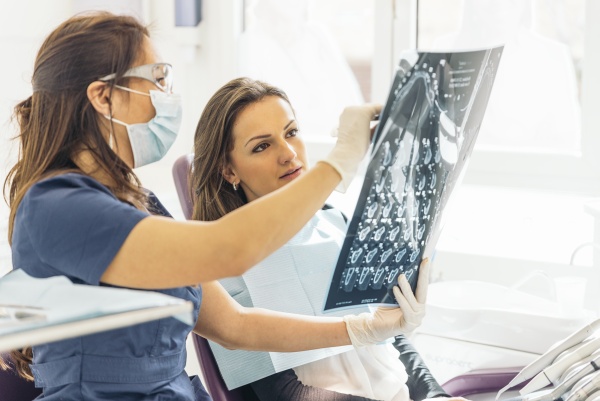What is a 3D Dental Scan?

If you are trying to find a dentist for yourself or loved ones, it is essential to get familiar with the technologies they use. Every dentist understands the benefits of using the latest tech inventions in dentistry for procedures. A 3D dental scan, for instance, is highly efficient, more accurate and less invasive than traditional x-rays.
If you have been scheduled for a restorative or cosmetic dentistry procedure like dental implants, the dentist may perform 3D dental scans to examine the condition of your jawbone. In this article, we cover some specific details about 3D dental scans and their benefits to inform and reassure you before undergoing the procedure.
How does 3D dental imaging work?
To get an image of your jaw and teeth, dentists employ a sophisticated device called a Cone Beam Computed Tomography (CBCT) machine. This machine makes it possible for the dentist to get detailed visuals of your mouth by developing a 3D image representing the actual appearance of your teeth in real life.
The 3D dental scan makes the process of planning treatments and accurate diagnosis of dental health issues much easier and seamless for dentists. The scan does this by helping the dentist see the depth, width, and height of each tooth in the oral cavity.
Traditional x-rays show dentists less-detailed images and are therefore quickly becoming redundant as increasing numbers of dentists adopt the CBCT technology. With a single 3D scan, the dentist can now see the muscles, teeth, nerves, jawbones and any instance of disease or infection.
What to expect during a 3D dental scan
Dentists use different types of 3D dental technology, so the situations may be different. You may need to lie down, stand or sit. However, the sitting position is more common in most cases because it keeps the patient at ease and is preferable for people with disabilities.
During the scan, the dentist will ask you to put your head on a chin rest to restrict movement. The machine will revolve around your head for some seconds to take images of your jaw, teeth and skull. While the procedure happens, negligible levels of radiation will hit your body to develop 100 to 600 pictures. The level of radiation exposure with 3D dental scan procedures is remarkably lower than that of traditional dental x-rays.
What are the effects of a 3D dental scan on the patient?
Patients opt for 3D dental scanning technology because it produces results that are more accurate in less time compared to traditional x-rays. 3D digital dental x-rays also make it possible for cosmetic dentists, orthodontists and restoration specialists to develop treatment plans easily. For instance, a CBCT machine can appraise bone structure to help the dentist ascertain if you would be qualified to get dental implants.
That is not all
Orthodontists will also find 3D dental scans highly beneficial because it will allow them to identify the teeth that need shifting for proper teeth alignment. Even if you think you have no oral health issues, 3D dental imaging can help the dentist diagnose minor problems before they worsen into severe conditions.
Request an appointment here: https://www.drelloway.com or call Randal S. Elloway DDS, Inc at (530) 527-6777 for an appointment in our Red Bluff office.
Related Posts
Curious about laser dentistry? Read on to learn more about this type of treatment. Medical professionals may modify or remove tiny quantities of tissue using lasers. While laser surgery has numerous applications outside of dentistry, the vast majority of patients had never ever heard of laser dentistry until they needed it. Dentists employ lasers for…
The use of laser dentistry to treat a variety of dental issues has been commercially available since 1989. Lasers are a less painful and more efficient option than the drills and tools used in traditional dental treatment procedures. Many patients also feel more comfortable with the sounds and feel of laser treatment. Laser treatment options…
Laser dentistry provides a less invasive way to perform treatments like deep cleanings. Keeping teeth free of plaque and tartar is an important part of keeping your mouth healthy. Tartar and plaque build-up on teeth leads to issues like tooth decay and gum disease.Dentists recommend getting teeth cleaned at least two times per year to…
The practice of laser dentistry offers an enhanced method for treating oral cancer. Soft tissue lasers can remove oral lesions with heightened precision. Patients experience many benefits of this treatment.The word "laser" stands for "light amplification by stimulated emission of radiation." Lasers were first approved for use in dentistry by the FDA in 2014. There…


